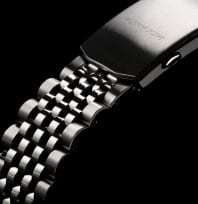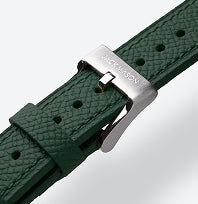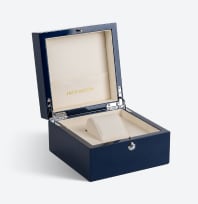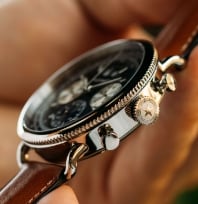Although a watch is not a new or inventive item, it is an item of status. It speaks to who you are, your life achievements, and where you intend to go in the future. As fast fashion has taken hold, the simple, wrist-worn signifier has diminished in value to many. What was once signified a major milestone moment, making the perfect gift for graduation, a first job or marriage, has fallen into a trend trap. We are reinventing this statement, bringing life, pride, and individuality back to watch ownership.
5 Things to Look For in a Watch
By educating you on what truly makes a quality watch, our team is elevating the industry in today's disposable accessory world, bringing meaning back to this purchase. These are the top five things we believe you should look for when buying a watch to ensure it is a quality timepiece that will last. 1. Case Material Watches are made in a variety of different metals that range from Zinc based alloys to solid precious metals with prices anywhere from $50 to $50,000, respectively. However, if you're looking for a watch that you know will last you for many years and won't cost you a small fortune, you should look for one made of Stainless Steel. This material comes in different grades, with the majority of the watch industry using 304 or 316L. Both grades are suitable for daily wear and tear and will last for years, with 316L having a slight advantage for its higher corrosion resistant properties. It's also commonly used in the food and health industry as it passes for being "surgical grade." In some rare cases, you will find 904L, which is considered to be extremely corrosion-resistant, but it's mostly seen in the high-end Swiss watch brands. Jack Mason uses 316L as a standard for all metal watch parts. 2. Water Resistance
Watches are made in a variety of different metals that range from Zinc based alloys to solid precious metals with prices anywhere from $50 to $50,000, respectively. However, if you're looking for a watch that you know will last you for many years and won't cost you a small fortune, you should look for one made of Stainless Steel. This material comes in different grades, with the majority of the watch industry using 304 or 316L. Both grades are suitable for daily wear and tear and will last for years, with 316L having a slight advantage for its higher corrosion resistant properties. It's also commonly used in the food and health industry as it passes for being "surgical grade." In some rare cases, you will find 904L, which is considered to be extremely corrosion-resistant, but it's mostly seen in the high-end Swiss watch brands. Jack Mason uses 316L as a standard for all metal watch parts. 2. Water Resistance  When searching for a watch, it's best to understand how the watch will be worn to find one that has the proper water resistance. An Atmosphere (ATM) is a unit of measurement used to indicate the water-resistance of a watch. One atmosphere equals 10 meters. For instance, if your watch usage is primarily in wet conditions, you are going to want to look for one that is at least 10ATM (100 meters). This level of resistance is safe for showering, precipitation, and swimming. Watches at 5ATM (50 meters) will be safe to wear if it comes in contact with rain or when you wash your hands. A watch under 5ATM, such as 3ATM, is not recommended for occasional rain and is at risk for water damage when washing your hands. Jack Mason watches are 10ATM and above to ensure safety from any day to day contact with water. 3. Sapphire Crystal vs. Mineral Crystal
When searching for a watch, it's best to understand how the watch will be worn to find one that has the proper water resistance. An Atmosphere (ATM) is a unit of measurement used to indicate the water-resistance of a watch. One atmosphere equals 10 meters. For instance, if your watch usage is primarily in wet conditions, you are going to want to look for one that is at least 10ATM (100 meters). This level of resistance is safe for showering, precipitation, and swimming. Watches at 5ATM (50 meters) will be safe to wear if it comes in contact with rain or when you wash your hands. A watch under 5ATM, such as 3ATM, is not recommended for occasional rain and is at risk for water damage when washing your hands. Jack Mason watches are 10ATM and above to ensure safety from any day to day contact with water. 3. Sapphire Crystal vs. Mineral Crystal  The crystal is the clear covering over the dial. Mineral crystals are most commonly used in watchmaking. These crystals are made up of different elements that are treated for hardness. For a much more scratch-resistant crystal, you want to look for a sapphire. This material is the second hardest mineral behind diamonds. Jack Mason watches come standard with sapphire crystals with an anti-reflective coating to reduce glare. 4. Movement
The crystal is the clear covering over the dial. Mineral crystals are most commonly used in watchmaking. These crystals are made up of different elements that are treated for hardness. For a much more scratch-resistant crystal, you want to look for a sapphire. This material is the second hardest mineral behind diamonds. Jack Mason watches come standard with sapphire crystals with an anti-reflective coating to reduce glare. 4. Movement  Movement types vary depending on the country of origin as they all come in different qualities and accuracy in keeping time. To have peace of mind in time-keeping accuracy and build quality, you will need to look for a watch with a Japanese or Swiss movement. Both countries have over 100 years of watchmaking experience and have the highest technology and the most skilled hands in the world. Jack Mason uses both Japanese and Swiss movements to ensure the highest quality of time-keeping. 5. Leather Straps
Movement types vary depending on the country of origin as they all come in different qualities and accuracy in keeping time. To have peace of mind in time-keeping accuracy and build quality, you will need to look for a watch with a Japanese or Swiss movement. Both countries have over 100 years of watchmaking experience and have the highest technology and the most skilled hands in the world. Jack Mason uses both Japanese and Swiss movements to ensure the highest quality of time-keeping. 5. Leather Straps  Leather quality can make or break a watch, sometimes literally. It's no secret that the country of Italy is home to some of the best leather tanneries in the world. Other countries also produce high-quality leather, but when it comes to watch straps, it is best to rub your fingers into the leather and feel how the surface reacts. It is quite easy to tell when a leather feels "plasticky" from the surface coating or just plain flimsy.
Leather quality can make or break a watch, sometimes literally. It's no secret that the country of Italy is home to some of the best leather tanneries in the world. Other countries also produce high-quality leather, but when it comes to watch straps, it is best to rub your fingers into the leather and feel how the surface reacts. It is quite easy to tell when a leather feels "plasticky" from the surface coating or just plain flimsy.
Check out the Watch Glossary to learn more about the features, functions, and materials of our watches.











